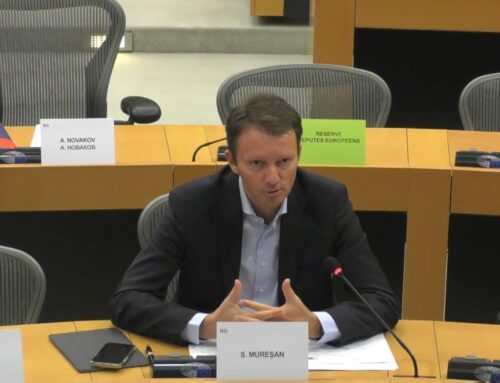The discussion about strengthening the European economy is very timely. Although the EU is facing urgent challenges now, we have to learn to tackle more than one crisis at a time. We still need to make efforts to improve the competitiveness and thus resilience of our economy when facing shocks,
In order to strengthen our economies, we have to tackle the root causes of the current crisis: Too much debt and too little competitiveness. It is necessary that the banking system returns to its mission of supporting the real economy, like financing entrepreneurship and SMEs. Progress has been made regarding the governance of the Eurozone, where the ECB monetary policy has been constructive. However, this help is limited and can only function as a bridge. There is no way around improving competitiveness through economic and political reforms, and I believe an appropriate tool for this can be a fiscal capacity of the Eurozone. The capacity should incentivize reforms especially in good economic times, when it makes sense to implement them, such as reforms already laid down in the Country Specific Recommendations (CSRs). An evaluation of the CSRs implementation rate could steer us towards reforms whose transposition require financial incentives through the fiscal capacity.
What kind of reforms do we need to make our economies more competitive? On the one hand, we have to reduce deficits and limit public debt, return banks to their initial function, allocate more financing to research and innovation, further invest in roads and railway infrastructure as well as improving energy and digital markets.
On the other hand, we need to reform labour markets to be more flexible in order to offer more opportunities to young people. We have to support entrepreneurship, start-ups and SMEs, further develop the single market, provide predictable and reliable tax and legal systems as well as insuring the functionality of the rule of law.
In addition, there is need to reform the budgets. The limited financial resources we have at public level should be allocated to those areas which strengthen our economies. The budget should be a reflection of our political priorities.
Moreover, we must invest in education. Schools and universities have to prepare the students with the necessary skills to be successful in the labour markets of the future. Many jobs of the future will require new skills, such as digital and e-skills.
Furthermore, the development of the governance of the Eurozone is necessary, but more important is the impact on the real lives of the citizens. We have to show how our actions in Brussels really help the economy, and more specifically, how they benefit entrepreneurs and SMEs. European citizens are rightly interested in the final results.
As pro-Europeans we have to talk about the achievements of European integration and present the EU as something which is still responding to the present and future needs of the citizens. In the past, the most urgent need was peace. Today, the challenges of the future are manifold, including the refugee crisis, increasing Euro scepticism and international conflicts.
If the European idea is challenged and questioned by populists, it is our obligation, besides defending the European idea, to improve and further develop it.









Stay In Touch